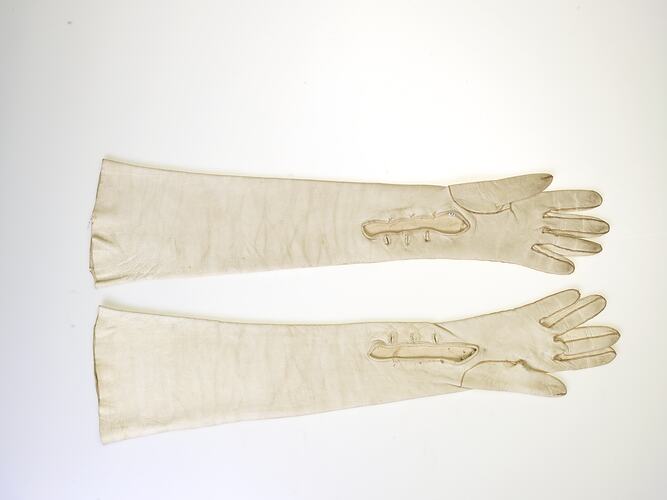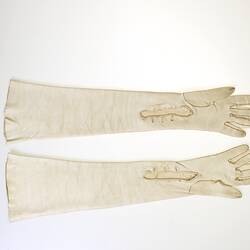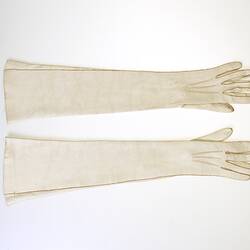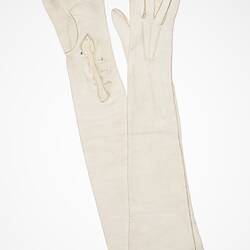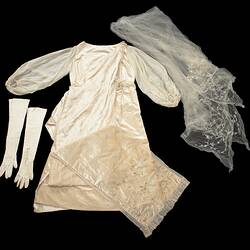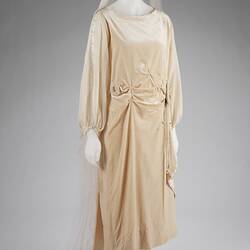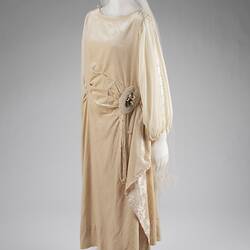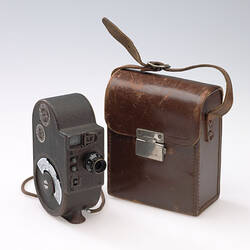Summary
One of a pair of cream kid leather gloves worn by Lili Vrahamis at her wedding to Letho Sigalas at the Greek Orthodox church in Victoria Parade, Melbourne on 18 July 1923. Made by a Greek dressmaker in Melbourne. After the ceremony, a large dinner was given for the newlyweds at café in Punt Road. Lili (Eleni) Sigalas (nee Vrahamis), was born in 1904,on the Greek Island of Sikinos. She was engaged to Letho, her cousin, in 1920. The couple had two daughters Dan'e in June 1924 and Magarita Babette in 1931.
Physical Description
Elbow length cream kid leather glove, with three button holes but no buttons.
Significance
The Sigalas family's immigration story is a rich narrative which relates to a number of themes in the history of social and immigration Melbourne. The curtain and collar represent the precious items brought by immigrants to Australia - in this case symbolising Lili's connections to Istanbul and the family left behind. The wedding dress is an evocative symbol of a key immigration motivation for young women - being brought out to Australia to marry men from similar cultural backgrounds, islands and villages. The 'flapper' dress represents the more affluent social life of some people in Melbourne during the 1920s, the kinds of functions people attended as well as a taste for French couture which could be obtained in select Melbourne stores. The documents represent both Lili's life before immigrating and after settlement, and complement the other objects. Copies of photographs will provide a critical visual context for the artefacts and the narrative.
The Sigalas family story signifies migration as a continuous experience for some people: of shifting from country to country until finding the right spot to settle (as in Iakovos' case); of the strong ties to homelands which draws people back again and again (where finances permit as it did with the Sigalas'); of chain migration; of finding brides in home countries in order to establish families in the new. While the objects do not directly pursue these themes, they can provide the point from which these complex migration themes can be explored.
Our immigration collections are not strongly represented in the inter wars period. Furthermore, the family's connection with the establishment of important café's in Melbourne such as the Anglo American (which became the Legend café) expand our curatorial interests in the development of Melbourne's café society.
More Information
-
Collecting Areas
Clothing & Textiles, Migration & Cultural Diversity, Public Life & Institutions
-
Acquisition Information
Donation from Babette Sigalas, Jul 2003
-
User
Mrs Lili Sigalas, Victoria Parade, Melbourne, Greater Melbourne, Victoria, Australia, 18 Jul 1923
Worn by Lili at her wedding to Letho Sigalas. -
Place & Date Purchased
-
Classification
-
Category
-
Discipline
-
Type of item
-
Overall Dimensions
541 mm (Length), 145 mm (Width)
These measurements are for each of the two gloves.
-
Exhibition Collection Management
541 mm (Length), 145 mm (Width)
individual glove
-
Keywords
Gloves, Immigration, Leather Products, Weddings, Women's Clothing Accessories
